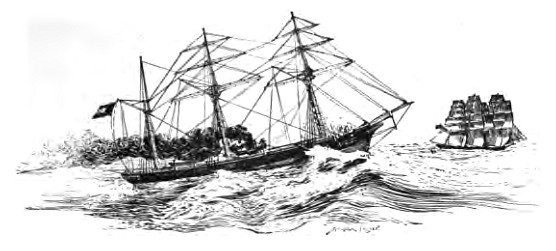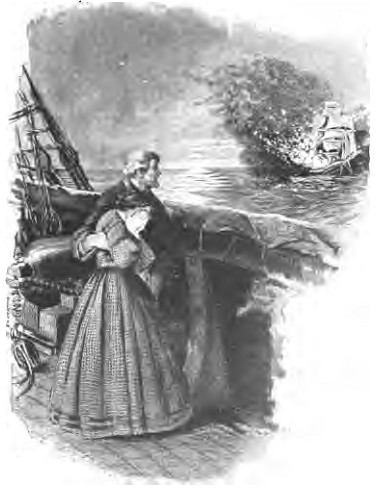| Web
and Book design,
Copyright, Kellscraft Studio 1999-2009 (Return to Web Text-ures) |
 (HOME)
|
 XXI. THE EMMA AND THE "LEAPING TARANTULA." THE Alabama, Captain Raphael Semmes, was a Confederate cruiser which, during the Civil War, carried on the piratical business of seizing American vessels hailing from the North, in whatever waters she found them. She was a handsome, rakish craft, painted black, and of a racing speed. Semmes, a reckless adventurer, was proud of his ship, and boasted that no vessel could escape the "Leaping Tarantula," as he called it. He was, in fact, so daring and so successful in his raids that his ship became a haunting terror to Northern merchantmen carrying their cargoes to foreign ports. The Emma, a stanch Maine vessel, commanded by her owner, Captain Jordan, was at Singapore, with a cargo of coal, when a report was spread abroad that the "Scourge of the Seas," which was the name the seafaring folk gave to the Alabama, had been seen in those waters; moreover, that she had seemed to be upon the Emma's track. Captain Jordan remained at Singapore a few days, and discharged a part of his coal. Then he sailed for Bombay, and left there the remainder of his cargo. Before leaving Bombay he also took a certain wise precaution, becoming in the master of a ship that might fall into the clutches of the "Tarantula." He had heard at Bombay that the Alabama had followed him to Singapore and had there seized and carried away some of the coal that he had left. Now, the track of the Emma lay along the Malabar coast; but Captain Jordan, knowing that the Alabama was likely to lie in wait there, shaped his course far out to sea. A close watch was kept, but although there were many steamers in those waters, there was no black, rakish Confederate cruiser to be seen. He had begun to congratulate himself on his safety, when, one morning, what was thought to be an English steamer appeared very near the Emma, under full sail. It was scarcely daylight when she was sighted by the Yankee vessel. When the sun rose she was only half a mile away, and she ran up the American flag. That was better yet: the stranger was a countryman and friend, thought the Yankees. Aloft went the stars and stripes from the Emma, in response. As the brilliant tropical sunlight fell upon her, it showed her to be a handsome, jaunty steamer, probably of American build. The captain and crew of the Emma were pleased and proud to meet a fine American steamer in the far-off foreign seas. The captain called his wife to come and see her, but Mrs. Jordan was not yet ready to leave the cabin. The roar of a gun came from the stranger—the port gun to windward. That was a signal to "heave to," and the Yankee crew obeyed it, doubtful as to what it might mean. When this was done, a boat was lowered from the strange steamer. It came swiftly and steadily over the smooth sea, and as Captain Jordan surveyed it through his glass, a slow-creeping fear leaped suddenly into certainty. He called down to his wife in the cabin: "Pack up your things as quick as you can, and be ready to go! The 'Tarantula' has got her claws upon us!" He had been deceived by the appearance of the steamer, but he knew that the lapstreak boat now nearing them was of English build and belonged to no steamer that had a right to hoist the stars and stripes. There was not a moment to lose. The rowboat was manned by a powerful crew and was almost upon them; and, like a crouching beast of prey, the black ship lay just ahead. Mrs. Jordan gathered together her treasures with trembling hands. The cozy little cabin, her home for many months, would soon be invaded by the pirate crew. The rowboat came alongside, and an officer mounted to the deck of the Emma. The message that he delivered was brief and businesslike: "You are commanded by Captain Semmes of the Alabama to take your papers and go on board his ship at once." Captain Jordan obeyed, since there was, clearly, nothing else to be done. The Emma was the helpless prey of the armed pirate ship. Captain Semmes received him with none of the decent courtesy due to a conquered foe. He was in especially bad humor when he learned that the Emma carried no freight, as he had expected to capture a fine cargo. He assured Captain Jordan that in twenty minutes he should burn the Emma. In that time the captain might bring off his wife and his crew, if he could. He would be so magnanimous as to allow him one trunk of clothing, and the sailors one bag each. The whole crew of the Alabama, nearly a hundred and fifty men, were let loose upon the Emma, to plunder and destroy at their will. They made a carousal of their opportunity, and drank all the liquor they could find. They dressed themselves in Mrs. Jordan's clothing, and they crowded into the cabin and sang vulgar songs to the accompaniment of a wild jargon on the parlor organ, which had hitherto been sacred, in all the Emma's voyages, to Sunday evening hymns. Their orgy was the more reckless because of their disappointment and disgust at finding no money. Captain Jordan had, most fortunately, sent home from Bombay all his cash, amounting to over twenty thousand dollars; but when he told them this they refused to believe it, and pulled up the ship's planks and overhauled the ballast in search of it. Maddened by the liquor and the disappointment, they seemed at length to be seized with a mania of destruction. They cut and hacked the cabin furnishings and smashed the dishes. With these diversions thrown in, it took all day to remove the valuable ship's stores to the Alabama, and the ship was not abandoned and fired until evening. Captain Jordan, his wife, and the crew had been removed to the Alabama. Before the last of the Alabama's crew left, the broken furniture was piled up in the cabin and fired, and then a match was applied to the forward part of the ship.  There was a dead calm that night, and the Alabama had to lay to, with the burning vessel close at her stern. Captain Jordan and his wife watched. through the night, the slow destruction of their ship. At first there were only volumes of smoke, so black and heavy as to hang like a pall over the sea, through which, now and then, there shot a fork of lightninglike flame. Then came a burst of flame through the cabin woodwork, 'and this made a sudden swift flight to the rigging. The tropic sun had beaten upon this for many days, and the tar was in a highly inflammable condition. Outlined upon the black smoke was, for a moment, a dazzling display of fireworks. The small ropes were a network of flame. It was a wonderful spectacle, but those who loved the Emma saw it through their tears. When the vessel threw her head into the air, hung for a moment, like a living thing that dies reluctantly, and was then sucked down into the mighty deep, there was a long sigh of relief that the agony was over. Semmes did not intend to be burdened long with his prisoners. As soon as they came within reach of land, he sent them ashore in boats. It was a barren land where they were left; the shore was inhabited by a few uncivilized natives, and there was a rampart of dreary black hills in the background. Captain Jordan begged to be taken to a port from which it would be possible to make his way home, or, at least, not to be left beyond the bounds of civilization; but all in vain. "We want to get rid of you as soon as possible," was Semmes's reply. "You must make ready to go ashore." Through a rough and stormy sea the Alabama's captives were rowed to the barren shore, where they were deserted. The Alabama waited only for her boats, which could not return until the ebb tide, and then the abandoned victims of the "Scourge of the Seas" saw her disappear, under steam and full sail, down the horizon. Captain Jordan and his companions found it difficult to make the natives understand their signs, but they were treated by them with a kindness which was strongly in contrast with the barbarity of the pirate crew; and when at length they succeeded in making the savages comprehend their desire to get to a distant port, they willingly took them in their canoes a distance of a hundred and fifty miles, a difficult and dangerous voyage. They made a port where it was possible to make connections with Bombay, and in due time they reached that city in safety. There they obtained money and made their way to Europe, and thence safely home to America. |